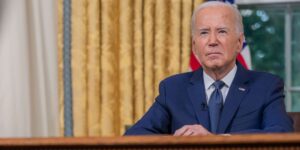Do You Think You’re Smarter Than God?
Miracles strengthen and affirm faith. They allow believers to celebrate God the healer and share His works. But what about when they don’t come? Where is God when loved ones are attacked by cancer, when they’re burned alive in a fiery crash, when a new babe doesn’t make it home from the hospital?
Atheist-turned-apologist Lee Strobel addresses these questions and more in his new book, The Case for Miracles.
“I knew I couldn’t write a book on miracles without dealing with [when miracles don’t happen],” Strobel says. “My wife has fibromyalgia. She’s been in pain every day for 20 years; she will be in pain every day until the rest of her life unless God does a miracle. And the miracle hasn’t happened, so this is a very relevant issue for me and for her.”
Strobel discussed this issue with philosopher and professor Douglas Groothius, whose wife is dying prematurely from dementia. Strobel flat-out asked, “If you were God, would you heal your wife?”
Groothius’ answer shocked him.
“No,” Groothius said. “If I were God, I would have His perspective, I would understand all things that God understands, and I would do the same thing that God is doing right now.”
When healing doesn’t happen, “We think we know better than God. I know better than God,” Strobel tells Charisma News. “I want [my wife] Leslie to be healed right now. And God apparently is not doing it, [so I might be tempted to think] therefore I’m smarter than God, I know better than God. That’s just not true.”
In some cases, Strobel says, believers may turned healing into an idol.
“Healing is never been automatic,” Strobel says. “I think the danger comes in when we make the healing an idol. … We probably don’t say it, but our attitude [says] that God, I will love You if You do what I tell You to do and heal me right now.
“That puts us in a position of being God because now we’re ordering God about, and we’re putting an idol in the way. I think it’s healthier to pray the prayer of relinquishment that Jesus prayed in the garden of Gethsemane, you know, ‘Can you take this cup from me? But if not, I want Your will to be done.”
When miracles do happen, though, they sometimes surprise the recipients.
“I’ve interviewed people who’ve had absolutely irrefutable miraculous miracles happen to them and healings happen to them, and I asked them, ‘Why you and not Leslie, my wife?’ and they always say, ‘I don’t know.’ ‘Are you more spiritual?’ ‘No, I don’t think so, I just think for whatever reason God in his sovereignty chose to heal me in a dramatic way and he hasn’t done that in all cases,'” Strobel says.
But some of those miracles—whoa!
Strobel devoted significant time and research to unveiling the supernatural. His book details awe-inspiring miracles that cannot be explained away through anything but the power and might of an omnibenevolent God.
He spoke to men and women who were on their death beds until God intervened.
One woman, Barbara, lost her body to multiple sclerosis. She was bound to her hospital bed, labeled as one of the most “hopelessly ill patients,” until she heard the Lord tell her to get up and walk.
So she did. Today, she’s a pastor’s wife who will gladly share the gospel and her testimony to anyone who will listen.
A man, Duane Miller, lost his voice to the flu. He resigned as pastor and lost a subsequent job because he couldn’t speak. For three years, nothing more than a rasp escaped his throat.
Until one day, a Houston congregation begged him to speak. While Miller was reading Psalm 103, the choking sensation fled his vocal cords, and the audience gasped. Miller could speak again.
It’s these testimonies that could bridge the gap between mainline evangelicals and Pentecostals, Strobel says.
Though he’s already widely revered among most Christian circles, his faith deepened through this research, and he hopes to help others’ faith do the same.
“I think unfortunately, the church sometimes is not open to the miraculous in ways that we should be,” Strobel tells Charisma News. “I speak from the perspective of a sort of a mainline evangelical. I don’t come from a charismatic background, and I think maybe it’s more important that I write this book than a well-known charismatic because you know, I think in the evangelical tradition in general needs to be more open to the work of the Holy Spirit.”
In America, though, people of faith are often more closed off to the supernatural than Christians around the world.
Strobel attributes this to the fact that most Americans have their needs met through modern technology and accessibility. Whereas someone in Mozambique would rely entirely on the supernatural to restore eyesight or hearing loss, Americans have hospitals and doctors who meet this need.
Also, Americans are sometimes embarrassed by the supernatural. Strobel says they want to be seen as the nice neighbor who happens to love Jesus but isn’t into that “weird stuff.”
But other countries aren’t fearful, as the supernatural realm is much more transparent than it can be in America.
Miracles precipitate the coming of the kingdom, Strobel says. In areas where the gospel is just now breaking through, God uses divine healings to validate His message. But that doesn’t mean He has stopped working in our own local neighborhoods.
To see His power personally, Strobel says he’s prayed for the Lord to open his own heart to the supernatural.
“God, help me, help open my eyes so I can see Your presence in this world in ways that I’ve never have before,” Strobel says he prays.
For others who want to see deeper works of the Holy Spirit, he continues the prayer: “I want to see it in the natural processes of nature that You’ve created. I want to see those supernatural moments that You intervene and blow our minds with Your creativity and Your love.”
Strobel believes Christians must learn to be more sensitive to the supernatural work in order to embrace it.
They must ask the Lord to “take away our pride, to take away our defensiveness, to take away our fear, because sometimes I think we fear the Holy Spirit,” Strobel says. “We fear what He might do that might be convicting or it might uncomfortable to us instead of inviting Him in His fullness to participate in our lives and in our churches.”
Strobel says he does this in his life increasingly since delving into the miracle research.
“I don’t think I’m going to be the same the rest of my life having written this book, having seen these stories, these reports, evidence of God’s miraculous work. I can’t see God in the same way that I used to. I see a much more vibrant personal authentic active way, more so than ever before.”
Amen.







































